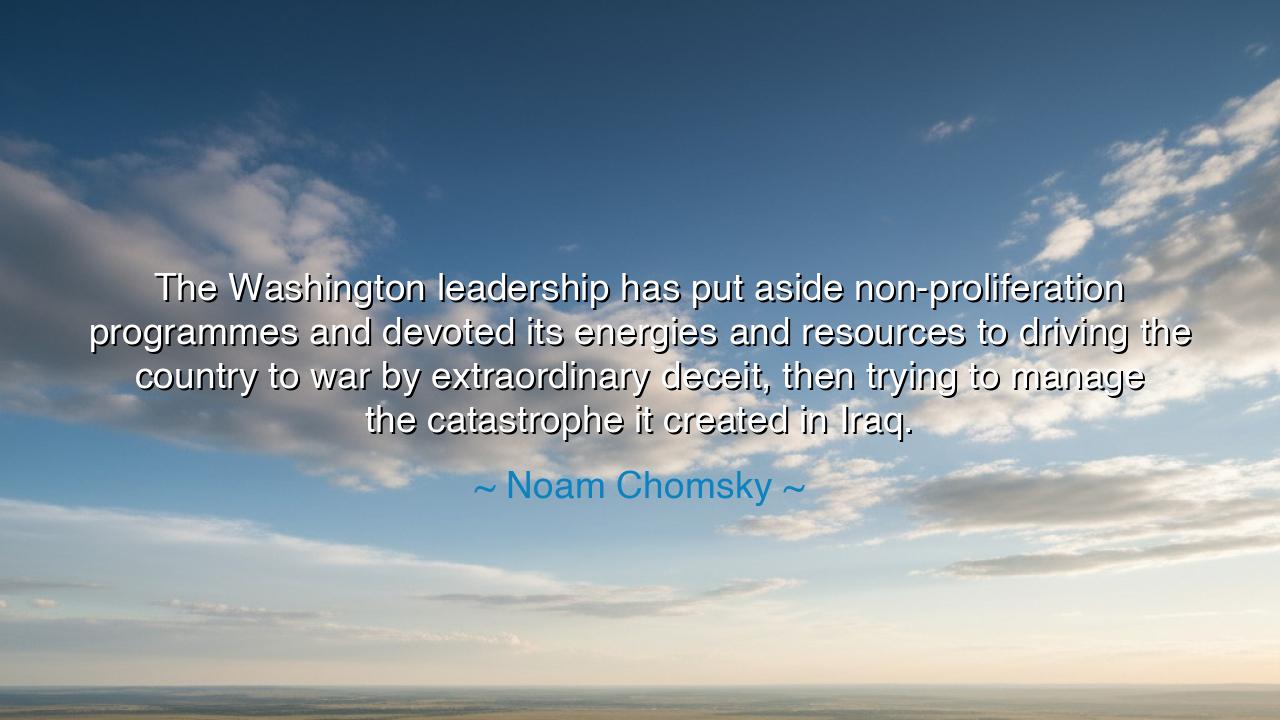
The Washington leadership has put aside non-proliferation
The Washington leadership has put aside non-proliferation programmes and devoted its energies and resources to driving the country to war by extraordinary deceit, then trying to manage the catastrophe it created in Iraq.






In the words of Noam Chomsky: “The Washington leadership has put aside non-proliferation programmes and devoted its energies and resources to driving the country to war by extraordinary deceit, then trying to manage the catastrophe it created in Iraq.” These words burn with the fire of warning, for they reveal the ancient folly of rulers who abandon wisdom for conquest, truth for deception, and peace for ambition. Chomsky, with the voice of a prophet, unmasks the peril of leaders who cloak their desires in lies, leading not only their own people but the world into suffering.
The ancients told of such tragedies. In Homer’s epics, the Trojan War was sparked not by necessity, but by pride and deception. Ten years of bloodshed followed, cities reduced to ash, and countless lives lost—all because rulers turned from peace to war, from truth to falsehood. What Chomsky speaks of in Iraq mirrors this timeless pattern: the abandonment of peace, the embrace of deceit, and the inevitable descent into chaos. The pattern is old, yet humanity repeats it, blind to the lessons of its past.
Consider the recent history that gives rise to his words. In the early years of the twenty-first century, the leaders of the United States set aside their commitments to non-proliferation, claiming the need to defend the world from weapons that did not exist. By the power of repeated falsehoods, they persuaded their people, and soon the engines of war were set in motion. But the fields of Iraq bore no such weapons; instead, they became soaked with the blood of innocents and soldiers alike. What was promised as liberation gave birth to occupation, division, and ruin.
History offers many parallels. The Peloponnesian War began when Athens, guided by ambition, justified its aggression with lies of necessity. Thucydides recorded that truth was twisted, words were corrupted, and war became inevitable. Athens, once a beacon of glory, was brought low by its own deceit. So too, Chomsky warns us, the catastrophe in Iraq was not simply a matter of miscalculation—it was the fruit of deliberate distortion, the triumph of deceit over wisdom.
The heart of Chomsky’s warning lies in the betrayal of trust. For when leaders abandon truth, the very fabric of democracy unravels. Deceit in the service of war is doubly destructive: it kills not only bodies, but also the spirit of nations, eroding faith in institutions and poisoning the bond between ruler and people. A catastrophe of this kind is not easily mended, for it leaves behind ruins both visible and invisible—ruins of lives, of communities, and of trust itself.
The lesson, then, is clear: guard against the seductions of war and the corruption of truth. Demand transparency from those who rule. Do not be lulled by words of fear or stirred by promises of easy victory. Remember always that war, once begun, rarely ends where its architects intend. Seek leaders who honor peace, who uphold non-proliferation, who strive for diplomacy before destruction. For the power of knowledge and truth is the only shield strong enough to prevent catastrophe.
Therefore, O listener, let this teaching echo in your heart: resist deceit, question the voices of power, and hold fast to peace. Raise your voice against unjust war, not in anger alone but in the strength of solidarity. For if leaders abandon wisdom, it is the people who must uphold it. And know this: the fate of nations is not sealed by the arrogance of rulers, but by the courage of citizens to demand truth and justice. Only then can humanity break the cycle of deceit and war, and walk the path of peace toward a future free of catastrophe.






AAdministratorAdministrator
Welcome, honored guests. Please leave a comment, we will respond soon